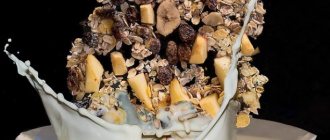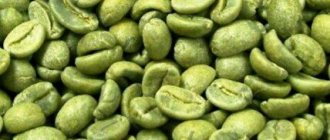Composition and beneficial elements of kefir
To understand exactly how kefir affects an athlete’s body, it is enough to study its composition in detail.
| Chemical composition of 100 g of product | ||||
| Vitamins | Kefir 1% fat | Percentage of an adult's daily requirement | Kefir 3.2% fat | Percentage of an adult's daily requirement |
| Vitamin A | ~ | ~ | 22 mcg | 2,4% |
| Vitamin C | 0.7 mg | 0,8% | 0.7 mg | 0,8% |
| Vitamin B1 | 0.04 mg | 2,7% | 0.03 mg | 2% |
| Vitamin B2 | 0.17 mg | 9,4% | 0.17 mg | 9,4% |
| Vitamin B12 | 0.2 mg | 6,7% | 0.4 mg | 13,3% |
| Vitamin PP | 0.8 mg | 4% | 0.8 mg | 4% |
| Macronutrients | ||||
| Potassium | 146 mg | 5,8% | 146 mg | 5,8% |
| Calcium | 120 mg | 12% | 120 mg | 12% |
| Sodium | 50 mg | 3,8% | 50 mg | 3,8% |
| Phosphorus | 90 mg | 11,3% | 95 mg | 11,9% |
| Magnesium | 14 mg | 3,5% | 14 mg | 3,5% |
Kefir contains exactly as much calcium as milk. But the mineral from fermented milk product is absorbed much better.
The role of vitamins included in kefir
- Vitamin A
is a powerful antioxidant that speeds up the body's recovery process after illness and increases resistance to seasonal viruses and infections. - Vitamin C or ascorbic acid
improves immunity, speeds up metabolism and effectively fights “bad” cholesterol. - Vitamin PP
makes blood vessels and capillaries more elastic, protects athletes from skin hemorrhages in contact sports, and gives energy. - B vitamins
are actively involved in metabolism: the metabolism of fats, proteins and carbohydrates. Our heart, digestive and nervous systems need them.
Common myth: kefir causes depression. This is wrong! The product contains the amino acid tryptophan, which stimulates the synthesis of serotonin, the hormone of joy. For insomnia, neurosis, and panic attacks, neurologists prescribe their patients to take tryptophan in capsules. Or you can simply introduce a tradition instead - pampering yourself with a glass of kefir.
Action of macroelements
- Potassium maintains the water-salt balance of the body, keeps blood pressure at the desired level and is responsible for the smooth functioning of the heart muscle.
- Calcium forms bone tissue and normalizes hormonal levels. But please note: fats are needed to absorb this mineral, so low-fat kefir cannot compensate for the lack of macronutrients.
- Sodium activates the body's production of enzymes, normalizes blood pressure, and ensures smooth muscle function.
- Phosphorus supplies the body with energy, actively restores muscle fibers after training, and relieves fatigue.
- Magnesium supports the nervous system and is responsible for carbohydrate metabolism in the body.
Thus, 4 glasses of kefir per day completely meet the calcium requirement of an adult. A delicious fermented milk drink strengthens the heart, calms the nervous system, while at the same time giving strength for new achievements.
Kefir has a pronounced relaxing and calming effect. This can be helpful when preparing for exams or competitions. But on those days when maximum concentration is needed, it is better to avoid fermented milk drinks.
But the most important ingredient of kefir is lactic acid bacteria: pre- and probiotics, similar to the natural human intestinal microflora. They stimulate digestion, improve food absorption and suppress pathogenic microorganisms. The probiotic Lactobacillus kefiri can inhibit the growth of E. coli, salmonella and the bacterium Helictobacter pylori, which causes gastritis and stomach ulcers.
Drink for digestion: what are the benefits of kefir and how to drink it correctly?
Kefir has a beneficial effect on the functioning of the cardiovascular and nervous systems and is a source of calcium and protein. Moreover, they are absorbed much easier than when drinking milk. In addition, kefir is a low-calorie product, and therefore is often included in therapeutic and sports diets.
Natural kefir contains many other useful substances: organic and fatty acids, natural sugars, vitamins A, B, C, PP, beta-carotene, magnesium, sodium, potassium, phosphorus, iron, zinc, iodine...
It is useful to drink kefir both in the morning on an empty stomach and before bed. In the first case, it facilitates digestion throughout the day, in the second, it suppresses the feeling of hunger and “populates” the intestines with beneficial bacteria overnight. Moreover, if it is recommended to drink milk at least two hours before bedtime, then kefir, due to the fact that it is better absorbed, can be drunk immediately before going to bed. The norm of consumption is considered to be a maximum of two glasses per day or no more than 400 ml per day.
This fermented milk drink also takes pride of place in the diet of children. Kefir, intended specifically for baby food, can be introduced after 8 months, and from the age of one year, regular kefir can be offered to the child. The permissible norm is 200-300 ml per day.
At the same time, you should know the characteristics of the product: it changes over time. Fresh kefir is soft and gentle, has laxative properties and effectively cleanses the body of metabolic products. If it was made more than 3 days ago, in this case, on the contrary, it strengthens. Towards the end of the shelf life, its taste becomes more intense.
Natural kefir should contain only two ingredients - pasteurized milk and a starter of living bacteria. This is exactly the kind of kefir produced by JSC Zolotye Luga, one of the largest dairy producers in the Urals and Siberia. The company uses high-quality milk, tested in a special laboratory. Then it goes to the workshop, where live kefir grains grown using a unique technology are added to it. This produces snow-white kefir with a clean, slightly sour taste.
In addition, in the unique trade line “Live Healthy!” from JSC "Golden Meadows" kefir enriched with lactulose is presented. It is an isomer of milk sugar and a kind of “benefit enhancer” of dairy products. The substance stimulates the growth of a person’s own microflora. As a result of the increase in bifidobacteria, pathogenic flora is suppressed, the body's resistance to infections increases, the synthesis of vitamins increases, and the risk of allergies decreases.
This product is produced by adding con. The taste qualities are similar to regular kefir, but its shelf life is even shorter - up to 7 days.
The drink is often used in cooking: in the preparation of salads, cocktails and soups. One of the most famous kefir dishes is cold okroshka. Housewives also use it to make fluffy pancakes.
Kefir should be stored in the refrigerator at a temperature of 2 to 6 degrees. With the advent of spring warmth, you should remember that in the sun the drink spoils in a matter of hours.
The benefits of kefir after training
Regardless of the purpose of training, one of the main goals of athletes is to maintain muscle mass. That is why, after each lesson, coaches always remind their students of the need to close the protein window. And kefir comes in very handy in this matter.
In 2015, the “Protein Summit” was held in the United States with the participation of 40 scientists: nutritionists, physiologists and cardiologists. The meeting resulted in revised standards for recommended consumption of protein foods. They were increased almost 2 times. And now people who regularly engage in strength training are prescribed to consume 1.6-2 g of protein per 1 kg of weight.
100 grams of kefir contain 3 grams of protein. Let's try to think a little:
- a girl weighing 50 kg
needs 80 g of protein per day. And two 200-gram glasses of kefir will fill this need by 15%; - an athlete weighing 90 kg
needs 144-180 grams of protein, and two glasses of fermented milk drink will provide 6.5-8% of this need.
Excellent indicator! Especially when you consider that the bulk of the protein in kefir is casein. Its main advantage is long digestibility. By maintaining protein levels at a certain level for several hours, casein saves the athlete from brutal hunger after training and prevents overeating.
In addition to replenishing protein deficiency, kefir drunk after training:
- fights dehydration;
- eliminates the calorie deficit that inevitably disappears during exercise;
- saturates cells with calcium;
- heals the digestive system;
- speeds up metabolism.
If the body does not absorb milk well, this is not a reason to give up kefir. The fermented milk product contains much less lactose, which often causes flatulence, abdominal pain and diarrhea in adults.
Dairy products and proper nutrition: to eat or not to eat?
Who can and who can't drink milk?
The source of rumors about the need to limit the consumption of milk and dairy products is lactose intolerance.
This is a genetic mutation that results in a deficiency of the enzyme that breaks down milk sugar (lactose). Consumption of milk in this case leads to abdominal pain, diarrhea and nausea.
In Africa, Southeast Asia and America, lactose intolerance is almost 100%; in Russia the percentage is lower, although some studies suggest that about half of Russians are lactose intolerant - 48%.
Overall, unless you're dairy intolerant, there's no reason to avoid it—research suggests that in adults, consuming dairy improves body composition and promotes weight loss.
In addition, milk consumption reduces the risk of developing type 2 diabetes, cardiovascular disease (especially stroke), and milk has a positive effect on bone mineral density, but is not associated with the risk of fractures.
What about fermented milk products?
Fermented dairy products - kefir, fermented baked milk, yogurt, yogurt, cottage cheese, hard cheeses - also contain lactose, but in negligible quantities, since fermentation processes have occurred in them.
Most often, even people prone to milk sugar intolerance have enough “strength” to cope with fermented milk products.
If you also have a reaction to fermented milk products in the form of nausea and digestive disorders, then try to find a source of calcium in other foods - legumes, broccoli, soy products, oranges. Consult your doctor - perhaps he will offer an effective solution to the problem.
They say that dairy products help the intestines and strengthen the immune system?
This is partly true. The intestines contain about 4-5 kg of microflora, which really helps to cope with various diseases - microflora stimulates the differentiation of the body's immune cells, so it is important to maintain its condition in a normal state.
Kefir after training for weight loss
If at the stage of gaining muscle mass, athletes can afford to drink high-calorie protein shakes after training, then when losing weight they have to count all the calories they eat.
| Nutritional value of products of different fat content (per 100 g) | ||
| Kefir 1% fat | Kefir 3.2% fat | |
| Squirrels | 3 g | 3 g |
| Fats | 1 g | 3.2 g |
| Carbohydrates | 4 g | 4 g |
| Calorie content | 40 kcal | 59 kcal |
The calorie content of kefir, even with high fat content, is not critical. One glass after training is only 118 kcal. Considering that fermented milk product suppresses hunger well, it is worth including it in the diet at least to prevent overeating.
An interesting experiment was carried out by scientists from the Australian Curtin University. They put 2 groups of volunteers on a low-calorie diet. But one group was prescribed to drink 3 cups of kefir a day, the other - 5 cups. As a result, those volunteers who drank more kefir lost more weight. Moreover, as a percentage, this group lost more of the dangerous visceral fat that accumulates in the abdominal cavity.
How and how much kefir can you drink after training?
If you feel incredibly hungry right after visiting the gym, you can drink a glass of kefir right away. And after 1-1.5 hours, eat a full meal. If your fitness classes have left you the strength to go for a walk, do not deny yourself this pleasure. And after 30-60 minutes, drink 1-2 glasses of fermented milk drink.
You can drink kefir in its pure form. But it’s much tastier - an enriched drink crushed with a blender:
Option 1:
1 teaspoon of honey, 200 ml of kefir, 1 green apple without peel;
Option 2:
200 ml of kefir, 200 grams of fresh strawberries, 1 tablespoon of crushed walnuts;
Option 3:
1 egg yolk, 1 banana, 400 ml kefir. The amount of ingredients is for 2 servings.
Please note: adding sugar to kefir is a bad idea! The body uses a huge amount of calcium to digest sugar, so you won’t get any benefit from a sweet drink.
You should not get carried away with kefir, as the product has a pronounced laxative effect. The maximum benefit will come from 300-600 ml of fermented milk drink per day.
Is it possible to drink kefir before or during training?
If you don’t have the time or opportunity to have a full lunch before training, it makes sense to drink a glass of high-fat fermented milk drink an hour before training. Kefir will dull your hunger and help you find the strength to do your best in the gym. But right in the middle of a workout, it’s better to drink only clean, warm water.
When is it possible and when not to drink kefir?
Recently, Gennady Onishchenko decided to speak out sharply against the use of kefir by drivers. “If you like kefir, then choose: drink kefir or drive,” he said. Such statements by the chief state sanitary doctor of Russia cannot but cause bewilderment. After all, many experts believe that regular kefir may well replace the increasingly widespread probiotics. Studies have shown that it is possible to improve health with the help of probiotics, but it is unlikely to be treated.
With the onset of seasonal cooling, drug manufacturers and some doctors are paying special attention to the prevention of acute respiratory viral infections and infectious diseases of the respiratory tract. According to statistics, up to 40 million cases of ARVI are registered annually in Russia, which is 90% of all infectious diseases. From complications associated with viruses, from 250 thousand to 500 thousand people die every year in the world.
True, death is gradually retreating in the face of new drugs, medical and sanitary technologies. Thus, scientists have already created about 30 different groups of antibiotics, which, by killing the pathogen, save people from many terrible infections. But at the same time, repeated use of antibiotics has changed the probiota (the totality of microorganisms inhabiting organs) of humans today, especially in industrialized countries, doctors say.
Antibiotic-associated diarrhea affects 30% of patients
Data obtained from a laboratory at New York University indicate that changes in intestinal microflora after taking antibiotics may be irreversible. So, according to statistics provided by a gastroenterologist, professor, head of the gastroenterology course at St. Petersburg State Medical University. I.P. Pavlova Yuri Uspensky, 1–1.2 billion different diseases accompanied by diarrhea are registered in the world every year; and 5 million cases of diarrhea are fatal. In Russia, 500 thousand cases of diarrhea in children are registered annually, and “antibiotic-associated diarrhea develops in 5–30% of people receiving antibiotics.”
At the conference “Probiotics as Immunity Modulators” held in early October, many experts argued that for the prevention and treatment of ARVI and influenza, to strengthen the immune system, it is necessary to take probiotics, dozens of options of which are already presented on the Russian market.
How is a probiotic better than drugs obtained through chemical synthesis? According to Professor Uspensky, the advantages of probiotics are their high safety profile, the almost complete absence of adverse reactions, and the absence of unwanted drug interactions with other simultaneously used drugs. Since there is no development of drug resistance when taking probiotics, there is no need to change the dose of drug therapy.
“Research on probiotics today makes it possible to suggest that they have many positive effects on human health, but for each specific strain, before products with it go on sale, there must be documentation confirming its positive health effects,” Professor Uspensky emphasized. “Probiotics differ in the number of strains/types of bacteria, the number of bacteria, the “survival” of bacteria in the stomach and intestines, effectiveness, safety and shelf life.”
The expert even considered it possible to prescribe probiotics and antibiotics simultaneously. But usually, in his opinion, probiotics should be taken no earlier than 10–14 days after stopping antibiotics.
On this topic
6630
You can chop it, but you can’t stew it
While officials divide budgets, forests continue to burn
Are claims about the healing properties of probiotics a marketing ploy?
Professor Uspensky considers the indications for prescribing probiotics to be the prevention and treatment of intestinal infections, intestinal dysbiosis, colitis, irritable bowel syndrome, chronic pancreatitis, and colon diseases. However, he notes that a particular effect can only be attributed to the specific strain (or strains) being tested, and not to the species or entire group of probiotics.
Another specialist, Doctor of Medical Sciences, Professor, Clinical Immunologist, Head of the Department of Faculty Pediatrics of the Moscow Faculty of the Russian State Medical University named after. N.I. Pirogov Andrey Prodeus especially emphasizes that only for some probiotic strains there are evidence-based studies confirming that they can act as a medicine in a specific clinical situation. There are diseases for which probiotics are not recommended, for example cancer. “And all other statements about the medicinal properties of probiotics are just marketing by companies creating probiotics, since in Russia, in order to register, expensive third-phase clinical trials are not required,” notes Professor Prodeus.
The promotion of probiotics today is a noisy and active commercial campaign on an international scale, candidate of medical sciences Alexey Bobrik is convinced, and the problem of dysbacteriosis after antibiotics itself has been made up out of thin air. “The influence of probiotics on disease outcomes is still questionable, since one or two studies could be carried out “in conjunction with the manufacturer”; an independent examination is needed here,” the expert insists.
Even though the patient’s bacteriological landscape changes after taking antibiotics, it is restored when the medication is stopped. “Maybe if you take a probiotic it will happen a little faster, but so what? – comments Bobrik. “There is no mass diarrhea that would require a market for probiotics; with antibiotic courses once or twice a year, a person can completely forget about them.” Nowhere, in any Western standards or recommendations, are they prescribed, the expert says.
The effect of kefir is no worse than that of probiotics
Skepticism regarding the possibility of treatment with probiotics is expressed by the President of the Society of Evidence-Based Medicine Specialists, Professor Vasily Vlasov. “The idea of using probiotics is quite old; it is most correct to attribute it to the activities and ideas of Ilya Mechnikov,” he explained to Our Version. – Based on his authority and plausible considerations, these drugs sold well, but their effect on beneficial events for people was not established in qualitative studies. That is, there was an effect on the immune system, as well as on appetite, on stool, etc., but the patient needs to get sick less often and recover faster. But this effect could not be established for a long time. Finally, at the end of the 20th century and in the 21st century, several good quality trials were carried out, which show that there is an effect, but it is very small and is not achieved by all drugs of this type, but only by some. I am not sure that the drugs mentioned are among those that have been found to have an effect.”
So, according to some experts, probiotics provide such a small effect that it is difficult to detect. But still, maybe the drugs are worth purchasing even for a slight improvement. Can they be used for preventive purposes, say, after taking antibiotics to normalize stool, including in children? “If you want to use it, you can,” says Professor Vlasov. – Children’s stool is unstable; it can be regulated by any fermented or vegetable products. But why use powders and tablets? They are more expensive and no better.”
Practicing gastroenterologists refer to probiotics as “the least harmful.” “I know that abroad there is simply no diagnosis of dysbacteriosis,” explains Ekaterina Grishchenko, candidate of medical sciences. – The state of the flora is secondary, everything will return to the individual circle when the cause of the disease is eliminated. A patient comes in whose flora state is somewhat different from the norm; she simply finished off her intestines with interventions based on various advice, and this was her individual norm. Diarrhea after an antibiotic does happen, but rarely, not in all patients, and it goes away. And I think that a probiotic is not a panacea, I warn patients that there may be no effect, but you can try taking a probiotic, it definitely won’t get worse. As for the improvement, it may be temporary."
In general, the experts surveyed agreed that in fact, you can achieve the same effect as from taking expensive probiotics using ordinary yogurt or kefir. Perhaps it makes sense for people who cannot tolerate milk protein to spend money on probiotics; for everyone else, it is more rational and tastier to drink kefir.
Is it possible to drink kefir at night?
The optimal scheme for using kefir by an athlete looks like this:
- 200 ml 30-60 minutes before training;
- 200-400 ml after sports;
- 200 ml immediately before bedtime.
This is where the main difference between kefir and milk lies. It takes time for the latter to be absorbed. Therefore, you can drink milk no less than 2 hours before bedtime. But the active lactobacilli in kefir do not limit the athlete: the drink can be consumed even while lying in bed, and the digestive tract will only thank you for this.
While you sleep, lactic acid bacteria will gently cleanse your intestines of waste and toxins. And if you make a glass of kefir at night a habit, within a week you will notice that your stool has returned to normal, your skin has become clearer, and your abdominal volume has decreased by a couple of centimeters. And calcium is absorbed better by our body at night, when the body is resting.
When first reporting complaints of insomnia, competent neurologists are in no hurry to prescribe sleeping pills and antidepressants to their patients, but advise drinking a glass of kefir at night. This product contains several elements that calm the nervous system: magnesium, potassium, vitamins A, C, B1 and B12.
How to choose the right kefir?
If you look closely at the table of the chemical composition of kefir, you will see an interesting thing: the content of vitamins and macroelements in a product with different fat content is almost identical. “So why eat extra empty calories if the benefits are the same?” - the loser will exclaim. And... he will be wrong.
A difference of 38 kcal per 1 glass of fermented milk drink will not make a difference. But calcium and protein from low-fat foods are absorbed much worse. Therefore, if 3.2% fat is too scary, make a reasonable compromise: buy kefir with a fat content of 2.5%.
The pursuit of low-fat dairy products very quickly leads to an increase in insulin in the blood. This entails metabolic failure, hormonal imbalances and... rapid weight gain.
Harm and contraindications of kefir after training
Alas, even such a useful product is not suitable for everyone. Kefir is contraindicated for:
- gastritis with high acidity;
- stomach ulcer;
- renal failure;
- lactose intolerance.
Some athletes calmly drink kefir after training, but drinking the drink at night results in painful heartburn for them. Most likely, in this case we are talking about reflux disease. It is not an absolute contraindication for consuming kefir. Just treat yourself to fermented milk products 2-3 hours before bedtime.
Using kefir for constipation
Without exceeding the norm, kefir can be consumed constantly. For greater benefits from using the drink, you must follow the established rules.
What time to drink
To overcome constipation, it is best to drink kefir on an empty stomach - either in the morning, immediately after waking up, or in the evening, before going to bed.
Drink kefir on an empty stomach in the morning or evening.
Drinking the drink at night is preferable, since during this time the intestines have time to cleanse themselves of accumulated waste and toxins, and in the morning all these impurities will be released naturally.
At what age can children
Today, based on scientific research, it is generally accepted that kefir can be given to children from 8 months. Some experts recommend offering the drink to a child from 12 months. In their opinion, kefir irritates the baby’s mucous membranes, which can cause bleeding.
Doctors recommend giving children 100 g of the drink per day; more can harm the delicate mucous membranes.
How much should I use?
Excessive consumption of kefir can lead to diarrhea. Doctors and nutritionists recommend including 1-2 cups of drink per day in your diet, i.e. 300-500 ml. You can drink kefir at night regularly, as a preventive measure.
Consuming kefir in large quantities leads to diarrhea.
For low acidity of gastric juice and constipation, kefir can be consumed 3 times a day before meals, ½ cup.
What can replace kefir?
Other products that can support muscle tissue after workouts include:
- milk . It also quenches thirst well, has a similar vitamin and mineral composition and activates the fat burning process;
- yogurt . It perfectly restores muscle fibers, and at the same time, many athletes drink it with much more enthusiasm;
- low-fat cottage cheese . This is no longer a snack, but a full dinner that does not burden the stomach, but at the same time gives satiety for a long time.
Whey protein capsules or powder can be a convenient alternative. It contains almost no proteins and carbohydrates, and the share of protein from different manufacturers is 60-80%!
With a well-planned diet that includes eggs, meat and dairy products, you can do without sports nutrition! The same popular BCCA contains only 3 essential amino acids, while fermented milk products contain 20 of them! Nature is wise and it is worth listening to it. And huge muscles are not the result of taking protein, but those same anabolic steroids that are destructive to the whole body.











